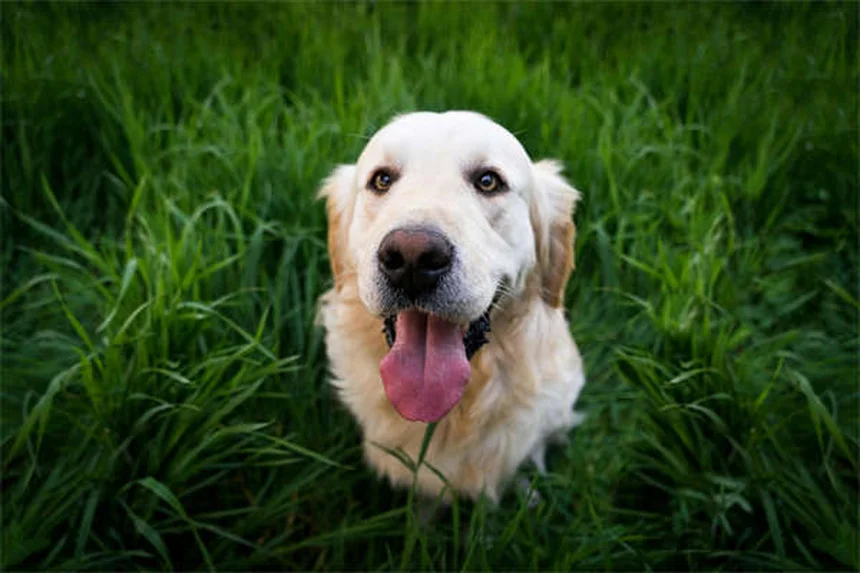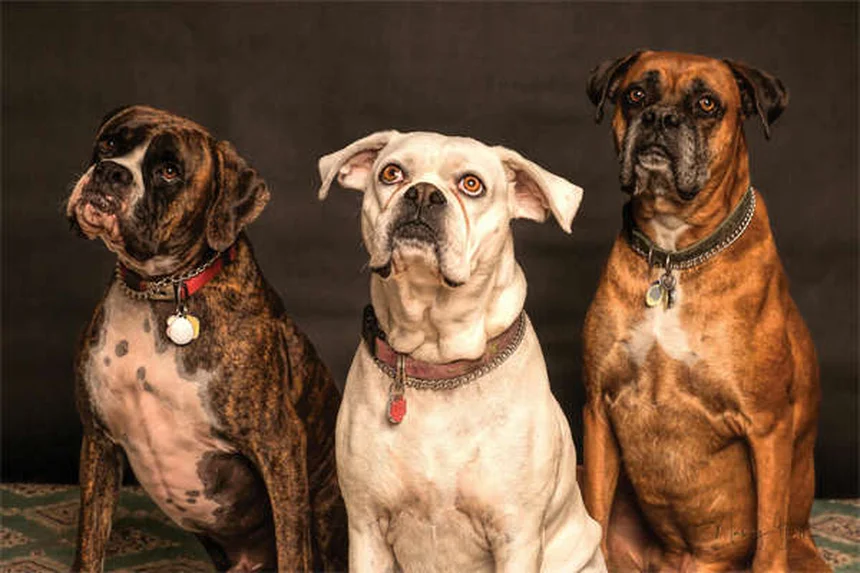8 Senior Dog Food Tips: Keep Your Aging Pup Healthy & Happy
Advertisement
What's the best way to feed your senior dog? The answer is: senior dogs need specially formulated food with fewer calories but more nutrients to support their changing bodies. Just like us humans, as dogs get older, their nutritional needs change dramatically. I've seen too many well-meaning pet owners accidentally overfeed their aging pups or miss crucial dietary adjustments.Your golden oldie still deserves delicious meals, but now we need to focus on joint support, digestive health, and maintaining muscle mass. The good news? With the right senior dog food and feeding strategy, you can help your furry friend stay active and comfortable well into their twilight years. Let me share what I've learned from veterinarians and years of experience caring for senior dogs.
E.g. :Why Is My Dog Licking Excessively? 5 Common Causes & Solutions
Advertisement
- 1、Understanding Your Senior Dog's Nutritional Needs
- 2、Choosing the Best Senior Dog Food
- 3、Feeding Schedule and Portion Control
- 4、Special Considerations for Senior Dogs
- 5、Transitioning to Senior Dog Food
- 6、When to Consult Your Vet
- 7、Beyond Basic Nutrition - Enhancing Your Senior Dog's Life
- 8、Adapting Your Home for Senior Comfort
- 9、The Emotional Side of Caring for a Senior Dog
- 10、Financial Planning for Senior Dog Care
- 11、Building a Support System
- 12、FAQs
Understanding Your Senior Dog's Nutritional Needs
Why Senior Dogs Need Special Food
You know how grandma starts eating smaller meals more often? Well, your aging pup's metabolism works the same way! Senior dogs typically need 20-30% fewer calories than their younger counterparts, but they still require nutrient-dense meals. Their bodies just process food differently now.
Think about it this way - would you feed a marathon runner and a retired book club member the same diet? Of course not! Your senior dog's activity level has changed, and so should their food. The key is finding the right balance between reduced calories and increased nutrients to support joint health, digestion, and cognitive function.
Common Health Issues in Older Dogs
Let me tell you about my neighbor's golden retriever, Max. At 12 years old, he developed arthritis and started gaining weight. Sound familiar? Many senior dogs face similar challenges:
- Joint problems (arthritis is super common)
- Weight management issues
- Dental health concerns
- Reduced kidney function
- Cognitive decline
The right senior dog food can actually help with these issues! For example, foods with glucosamine support joint health, while antioxidants may help with brain function. Pretty cool, right?
Choosing the Best Senior Dog Food
 Photos provided by pixabay
Photos provided by pixabay
What to Look for on the Label
Ever stood in the pet food aisle feeling completely overwhelmed? I've been there too! Here's what really matters when picking senior dog food:
| Nutrient | Why It's Important | Good Sources |
|---|---|---|
| Protein | Maintains muscle mass | Chicken, fish, eggs |
| Fiber | Supports digestion | Pumpkin, sweet potatoes |
| Omega-3s | Reduces inflammation | Salmon, flaxseed |
But here's a pro tip: the first ingredient should always be a high-quality protein source. If you see "meat by-products" or "corn" at the top of the list, put that bag right back on the shelf!
Wet Food vs. Dry Food Debate
Did you know some senior dogs actually prefer wet food? It's true! As dogs age, they often develop dental issues that make crunching kibble uncomfortable. Wet food can be easier to eat and provides extra hydration - super important for older pups.
But dry food isn't all bad either! The crunchy texture helps clean teeth (to a degree), and it's usually more convenient for pet parents. My advice? Consider mixing both to get the benefits of each. Start with 75% dry and 25% wet, then adjust based on your dog's preferences and needs.
Feeding Schedule and Portion Control
How Often Should You Feed Your Senior Dog?
Remember when your puppy needed three meals a day? Well, senior dogs often do better with multiple small meals too! Here's why:
- Easier on their digestive system
- Helps maintain steady energy levels
- Prevents bloating (which can be dangerous)
I recommend feeding two to three smaller meals instead of one big one. And here's a funny story - my friend's dog actually started reminding her when it was meal time by gently pawing at his empty bowl. Smart cookie!
 Photos provided by pixabay
Photos provided by pixabay
What to Look for on the Label
Ever heard the saying "eyes bigger than stomach"? That definitely applies to senior dogs! Their metabolism slows down, but their appetite might not. Overfeeding is one of the biggest mistakes we make with older dogs.
Here's what works for me: I use an actual measuring cup (not just eyeballing it) and stick to the recommended portions on the food package. But remember, these are just guidelines - your vet can help you adjust based on your dog's specific needs.
Special Considerations for Senior Dogs
Hydration is Key
Did you know older dogs are more prone to dehydration? It's true! Their sense of thirst diminishes with age, just like ours does. I always make sure my senior dog's water bowl is fresh and easily accessible.
Here's a trick I learned: add a splash of low-sodium chicken broth to their water to encourage drinking. Or try a pet water fountain - many dogs prefer moving water! Proper hydration helps with kidney function and digestion, two areas that often need support in senior dogs.
When to Consider Supplements
Think of supplements like vitamins for your dog - sometimes they're necessary, but they shouldn't replace a balanced diet. Common supplements for senior dogs include:
- Glucosamine for joints
- Probiotics for gut health
- Fish oil for skin and coat
But here's the million dollar question: Does your dog really need supplements? The answer depends on their individual health and diet. Some high-quality senior foods already include these beneficial ingredients, so check with your vet before adding anything extra.
Transitioning to Senior Dog Food
 Photos provided by pixabay
Photos provided by pixabay
What to Look for on the Label
Switching foods suddenly can upset any dog's stomach, but seniors are especially sensitive. I learned this the hard way when I changed my dog's food too quickly - let's just say it wasn't pretty!
The golden rule? Transition over 7-10 days, gradually increasing the amount of new food while decreasing the old. Start with 25% new food mixed with 75% old, then move to 50/50, and so on. Your dog's digestive system will thank you!
Monitoring Your Dog's Response
After switching foods, keep an eye out for:
- Changes in energy levels
- Coat condition
- Stool quality
- Appetite
These are all signs that tell you whether the new food agrees with your pup. And remember - what works for one dog might not work for another. My sister's poodle thrived on one senior brand, while my lab needed something completely different!
When to Consult Your Vet
Red Flags to Watch For
While most dietary changes for senior dogs are straightforward, some symptoms warrant a vet visit:
- Sudden weight loss or gain
- Excessive thirst
- Loss of appetite for more than a day
- Vomiting or diarrhea
Here's something important to remember: Is your dog just getting older, or is there a medical issue? Only your vet can tell for sure. Regular check-ups become even more crucial as your dog ages - I take mine every six months now instead of annually.
Customized Nutrition Plans
Some senior dogs need special diets for conditions like kidney disease or diabetes. If your vet recommends a prescription diet, don't panic! These foods are specially formulated to manage specific health issues.
I'll be honest - they're usually more expensive, but they can actually save you money in the long run by preventing costly health complications. And many dogs really like them! My cousin's beagle actually got excited for her kidney-friendly meals - go figure!
Beyond Basic Nutrition - Enhancing Your Senior Dog's Life
The Power of Mental Stimulation
You know how crossword puzzles keep grandma sharp? Your senior pup needs brain games too! Mental stimulation is just as important as physical nutrition for aging dogs. Try these simple tricks:
Food puzzles are my absolute favorite - they slow down eating while giving that noggin a workout. I use a simple Kong toy stuffed with kibble and peanut butter (xylitol-free, of course). Watching my 10-year-old lab figure it out is like witnessing canine Einstein at work! Mental exercise can actually delay cognitive decline - studies show dogs who get regular brain challenges maintain better memory and learning abilities.
Socialization Never Gets Old
Ever notice how your senior dog still wags their tail at familiar faces? That's because dogs never outgrow their social needs! While they might not want to wrestle like puppies anymore, gentle interactions keep their spirits high.
I organize "senior playdates" with my neighbor's older golden retriever - they mostly sniff around together and nap in the sun. Perfect! Even short visits to dog-friendly stores or quiet parks provide wonderful sensory stimulation. Just remember - like that one aunt at family gatherings, older dogs appreciate shorter, calmer social sessions.
Adapting Your Home for Senior Comfort
Creating a Senior-Friendly Space
Would you make grandma climb stairs to get to bed? Probably not! Here's how we can make homes more comfortable for aging pups:
Orthopedic dog beds are worth every penny - I splurged on a memory foam one last year and my dog's arthritis stiffness improved noticeably. Place them in multiple rooms so your pup always has a comfy spot. Non-slip rugs are another game-changer, especially on hardwood floors where older dogs tend to slide. I even put a small ramp by my bed so my senior girl can still sleep beside me without jumping.
Temperature Matters More Than You Think
Did you know senior dogs regulate body temperature less efficiently? It's true! My old timer used to love snow, but now she shivers after just a few minutes outside.
Here's my pro tip: keep your home slightly warmer than you used to, and invest in a cozy dog sweater for walks. In summer, make sure they always have access to cool, shaded areas. I bought a cooling mat that my dog absolutely loves - she plops right down on it after short walks. Simple adjustments make a world of difference for their comfort!
The Emotional Side of Caring for a Senior Dog
Celebrating the Golden Years
While we focus on their physical needs, let's not forget the joy senior dogs bring! Every gray hair tells a story of shared memories. I started a "senior photo album" to document our special moments - from lazy Sunday cuddles to gentle strolls.
Create little traditions that honor your bond - maybe a weekly grooming session with extra belly rubs, or special "senior treats" during movie nights. These moments become treasures you'll cherish forever. My heart melts when my old girl rests her head on my lap - it's like she's saying "thanks for growing old with me."
Preparing for the Tough Decisions
Let's be real - caring for an aging pet isn't all cuddles and photo ops. There comes a time when we must ask: Are we keeping them comfortable or just keeping them alive? This is perhaps the hardest question any pet owner faces.
Quality of life scales can help objectively assess their wellbeing - I keep one on my fridge as a reminder. Regular vet checkups provide professional guidance, but ultimately, you know your dog best. When my childhood dog reached his final days, our vet gave wise advice: "Better a week too early than a day too late." These decisions are heartbreaking, but made with love.
Financial Planning for Senior Dog Care
Budgeting for the Golden Years
Let's talk dollars and cents - senior dog care often costs more than puppyhood! Between special food, medications, and more frequent vet visits, expenses add up quickly. Here's how I manage:
| Expense Category | Average Monthly Cost | Money-Saving Tips |
|---|---|---|
| Premium Senior Food | $50-$100 | Buy in bulk, watch for sales |
| Joint Supplements | $20-$40 | Ask vet about human-grade options |
| Regular Vet Care | $50-$150 | Preventative care saves money long-term |
I set aside a "senior dog fund" years ago - best decision ever! Pet insurance can also help, though pre-existing conditions usually aren't covered. Planning ahead prevents tough choices between your wallet and your dog's health.
When to Consider Pet Insurance
Is pet insurance worth it for senior dogs? The answer might surprise you! While premiums are higher for older pets, major health issues become more likely.
I compared policies when my dog turned 8 and found one that made sense for our situation. The peace of mind is priceless - when she needed an unexpected ultrasound last year, insurance covered 80%! Just read the fine print carefully, especially regarding age limits and pre-existing conditions. Some providers specialize in senior pet coverage - worth checking out!
Building a Support System
Finding Your Tribe
Caring for an aging dog can feel lonely sometimes. That's why I joined a "Senior Dog Parents" Facebook group - turns out thousands of people share this journey!
Local pet stores often host senior dog events too. I met my now-best friend at a "Yappy Hour for Mature Pups" where our dogs mostly napped while we swapped care tips. Having people who understand makes all the difference when you're up at 3 AM comforting a confused old dog or facing tough decisions.
Professional Help When You Need It
There's no shame in asking for help! When my job required travel, I found an amazing pet sitter specializing in senior care. She administered medications and sent me daily updates - worth every penny.
Consider these professionals who can help:
- Veterinary physical therapists
- Mobile groomers who come to your home
- Pet loss counselors for emotional support
Building this support network before crises hit gives you options when challenges arise. I keep a "senior dog care team" list on my fridge - because even superhero pet parents need backup sometimes!
E.g. :Feeding Mature and Senior Dogs | VCA Animal Hospitals
FAQs
Q: How often should I feed my senior dog?
A: Senior dogs typically do best with two to three smaller meals per day rather than one large meal. Here's why this works better: their metabolism slows down with age, making it harder to process large amounts of food at once. Smaller, more frequent meals are easier on their digestive system and help maintain steady energy levels throughout the day. I personally feed my 10-year-old Labrador at 7am, 12pm, and 5pm - this schedule prevents that uncomfortable bloated feeling while keeping her satisfied. Remember to measure portions carefully using an actual measuring cup, as overfeeding is one of the most common mistakes we make with older dogs.
Q: What ingredients should I look for in senior dog food?
A: When choosing food for your aging pup, focus on high-quality protein sources like chicken, fish, or eggs as the first ingredient. Senior dogs need about 20-30% fewer calories but still require nutrient-dense meals. Look for added glucosamine for joint health, omega-3 fatty acids to reduce inflammation, and fiber for digestive support. I always check for these key nutrients in my dog's food: 1) Protein to maintain muscle mass, 2) Fiber from sources like pumpkin or sweet potatoes, and 3) Antioxidants for cognitive function. Avoid foods where corn or meat by-products are the main ingredients - these just don't provide the quality nutrition your senior deserves.
Q: Should I switch to wet food for my senior dog?
A: Many senior dogs benefit from wet food, but it's not necessarily an all-or-nothing decision. Here's my professional take: wet food is easier to chew for dogs with dental issues and provides extra hydration, which is crucial for older pups. However, dry food helps clean teeth (somewhat) and is often more convenient. What works best for most pet parents? A combination approach! Start with 75% dry food and 25% wet food, then adjust based on your dog's preferences and needs. My neighbor's 12-year-old golden retriever does great on a 50/50 mix - the wet food makes it more appealing while the kibble gives his teeth some gentle cleaning action.
Q: When should I consider supplements for my senior dog?
A: Supplements can be helpful, but they shouldn't replace a balanced senior dog food. Common supplements we recommend include glucosamine for joints, probiotics for gut health, and fish oil for skin and coat. However, many high-quality senior formulas already include these beneficial ingredients. Here's what I tell all my clients: consult your vet before adding supplements, as some can interact with medications or provide unnecessary nutrients. For example, my own dog gets a joint supplement because her food doesn't contain enough glucosamine, but we skipped the fish oil since her food already has plenty of omega-3s. It's all about customizing to your pup's specific needs!
Q: How do I transition my dog to senior food?
A: Transition slowly over 7-10 days to avoid digestive upset - senior dogs' stomachs are particularly sensitive. I recommend starting with 25% new senior food mixed with 75% of their current food for 2-3 days, then moving to a 50/50 mix, then 75/25, before finally switching completely. Watch for changes in energy levels, coat condition, stool quality, and appetite during this transition period. Pro tip: if your dog seems hesitant about the new food, try warming it slightly or adding a tablespoon of low-sodium chicken broth to enhance the aroma. Remember, what works for one senior dog might not work for another - my sister's poodle loved her new senior food immediately, while my lab needed a full two weeks to adjust!







